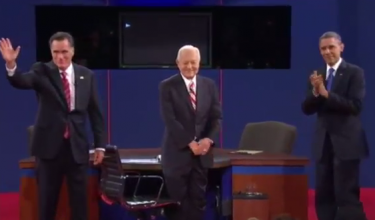To see our prior coverage of the U.S. presidential debates, click here and here [es].
Lynn University in Boca Raton, Florida was the epicenter of the third and final debate between President Barack Obama and former Massachusetts Governor Mitt Romney amidst a tight presidential race. As expected, the debate concentrated on foreign policy, specifically regarding China and the Middle East. Curiously enough, the debate took place on the 50th anniversary of the Cuban Missile Crisis, one of the most critical moments in the contemporary history of United States foreign policy.
Moderated by veteran CBS journalist Bob Schieffer, the debate started off with a Romney who, were he to become president, would aim to have the Islamic world reject the terrorist doctrine with the help of experts in the region. In the case of Syria, both Obama and Romney mentioned that President Bashar al-Assad “must go” with the support of Turkey and other allied countries in the region since “his days are numbered.”
Other topics that prevailed during the debate included China's role in the U.S. economy and security, the already historic alliance with Israel and Iran's nuclear program in addition to the war in Afghanistan as well as the role that Pakistan is playing given its geographic position and possession of nuclear weapons.
The highlight of the debate, according to experts, was the way in which Obama “ridiculed” Romney's stance on foreign policy, in particular with respect to military spending. The president criticized Romney for stating that Russia was the country's “number one” geopolitical enemy and reminded him that the Cold War ended 20 years ago.
In response to Romney's criticism on the reduction of navy ships in comparison to former administrations, Obama replied saying Romney does not spend enough time learning how the military works, and added that there are also “fewer horses and bayonets,” precisely due to the change in military tactics. This last comment made it to Twitter via hashtag #horsesandbayonets, which was the number 3 trending topic worldwide that night.
Although Romney briefly mentioned Latin America as a region that, as a whole, has an economy comparable to that of China, he did not go in depth about its importance during the debate. Many Twitter users took note of this, such as Nicolás López Correa (@NicolasLopezCo) who said:

From left to right: Romney, moderator Bob Schieffer, and Obama at the third presidential debate. Photo taken from a video of the debate on YouTube.
@NicolasLopezCo: Latinoamérica sólo fue mencionada sólo por un candidato en el debate presidencial de USA y fue @MittRomney. Atención inmigrantes latinos
@NicolasLopezCo: Latin America was only mentioned by one candidate during the U.S. presidential debate and it was @MittRomney. Attention Latino immigrants.
Pedro Aranguren (@PedroAranguren) was disappointed about the lack of attention given to U.S.-Latin American relations:
@PedroAranguren: Debate presidencial de EEUU demuestra que Latinoamérica no está en su agenda. Seguimos siendo “patio trasero”
@PedroAranguren: The U.S. presidential debate showed that Latin America is not on their agenda. We continue to be their “backyard”
Users like Jose Luis Pedauga (@jlpedauga) expressed the same sentiment:
@jlpedauga: Latinoamérica está ausente en los temas de debate presidencial de EEUU http://dlvr.it/2MKvqX
@jlpedauga: Latin America is absent from the topics of the U.S. presidential debate http://dlvr.it/2MKvqX
Similarly, Alejandro EC (@Alex_ec) noted Mexico's absence from the debate:
@Alex_ec: Ni una sola mención de México y Latinoamerica en el tercer y ultimo debate presidencial entre Obama y Romney, es… http://fb.me/xxChi7oQ
@Alex_ec: Not even a single mention of Mexico and Latin America in the third and final presidential debate between Obama and Romney, it's… http://fb.me/xxChi7oQ
Eugenio G. Martinez (@puzkas) noted that the region pushed aside when talking about the U.S. foreign policy:
@puzkas: El tercer debate presidencial estadounidense demuestra que latinoamerica (Venezuela-Chávez incluidas) no son prioridades para EEUU
@puzkas: The third presidential debate shows that Latin America (Venezuela-Chávez included) is not a priority for the United States
Others, like Juan Carlos Verdía (@VerdiaJ), affirmed that residents of Florida, where the debate took place, should pay close attention as the debate developed:
@VerdiaJ: Cubanos de #Miami atentos a debate presidencial http://goo.gl/Ju67D
@VerdiaJ: Cubans of #Miami, pay attention to the presidential debate http://goo.gl/Ju67D
Users like Martín (@fragmentario) pointed out that the debate had a somewhat belligerent tone:
@fragmentario: El debate presidencial yanqui es el único sitio en que la pretensión de matar personas va en el curriculum y no en la historia clínica.
@fragmentario: The American presidential debate is the only place where an intent to kill people goes on someone's resume and not their clinical history.
Manuel A. Merlo Mtz. (@ManuelMerloMtz) said that the debate did not give enough importance to the topic of military spending:
@ManuelMerloMtz: Escuchar en el Debate Presidencial de EU a los candidatos hablar de Presupuesto Militar como CUALQUIER COSA…
@ManuelMerloMtz: Listening to the candidates in the U.S. presidential debate talk about military spending like its ANY OLD THING…
Once again netizens debated between watching the debate versus sporting events, like the case of Jennifer Torres P (@JenniferTorres6)
@JenniferTorres6: Que lío este. Elegir entre el juego de St Luis y San Francisco y el debate presidencial por Estados Unidos
@JenniferTorres6: What a mess. Choosing between the St. Luis-San Francisco game and the United States presidential debate
Minutes after the debate ended, surveys like the one carried out by CNN affirmed that more than half of their viewers named Obama the winner. Likewise, other U.S. channels like CBS predicted that the current leader won the last debate in the face of the forthcoming elections where undecided voters awarded him the victory by 53% compared to the 23% that Mitt Romney received.






